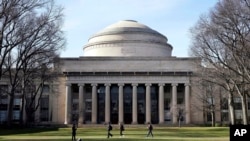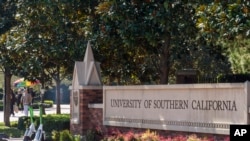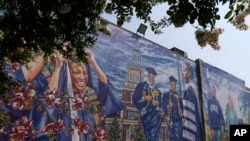Student Union
Game Show Contestant Reads This Every Night

Not many computer science students command a lot of attention, especially from the American public.
But Yale University student Matt Amodio persevered 38 consecutive times on the wildly popular and geeky game show Jeopardy! where the goal is to know more than your fellow contestants and win a lot of money. His streak ended Monday when he answered a clue incorrectly in Final Jeopardy.
Amodio is a fifth-year doctoral candidate in computer science at the Ivy League university in New Haven, Connecticut. He ranks second in number of games won on Jeopardy! to Ken Jennings, who won 74 consecutive times in 2004, and third in total winnings — $1,417,401 for Amodio, $2,462,216 for James Holzhauer and $2,520,700 for Jennings.
“It feels incredible,” Amodio wrote in an email reported last week in the Yale Daily News, the nation’s oldest daily college newspaper. “I don’t feel like I’m good enough to be considered [among] the greats, but I try to imagine what it would be like for me to read my stats as if they were somebody else’s. I know I would be impressed by someone doing what I’ve been doing, so I try to let myself feel proud of that.”
The long-running game show has a unique format, in which three contestants vie to be the first to supply the question to an answer they are given. If an answer is, “It’s where the world’s largest mall is located,” the correct response would be, “What is China?”
Avid reader
In a question-and-answer with the university, Amodio said reading is the key to his knowledge, specifically the online free encyclopedia Wikipedia.
“I highly recommend Wikipedia for anyone with unbridled curiosity!” Amodio told VOA. “I am constantly asking questions about the world, and the fact that answers to those questions are at our fingertips is an unbelievable gift.”
Amodio described the amount of information available on the site as “unfathomable.”
He told VOA that musical questions were his most challenging.
“The hardest questions for me are identifying songs based on their lyrics,” he wrote in an email. “Even for songs that I love and listen to thousands of times, I realize I pay more attention to the notes and the music than the lyrics. When I see the words written on a page, it's like it's a whole different world!”
And what's going on in his mind in the milliseconds to consider his answers and respond with a hand-held ringer?
“I generally go through a series of steps of reading, thinking of possibilities, ranking them in order of likelihood, and then double-checking with the question,” he explained. “The more time I take to double-check, the better the results will be, I think. So, I take as much time as I'm given, usually. I try not to rush myself.”
Education
The Jeopardy! champ graduated with honors from Ohio State University in 2012 with his bachelor’s degree in actuarial science, then earned his master’s in applied statistics there in 2012 before gaining a second master’s degree in 2015 from the University of Wisconsin-Madison in artificial intelligence. The Medina, Ohio, native is continuing his work in artificial intelligence at Yale.
He said two challenges in playing the game show, in addition to recalling information and reacting before his competitors, are adjusting to a taping schedule that starts at 7 a.m. and ends about 7 p.m., and thinking of a clever anecdote that contestants say during their on-air introduction.
“I was actually just as stressed about that part of the show as I was about the questions and answering part of the show,” he told Yale. “What am I going to say, how am I going to say it?”
What interests him
On his LinkedIn.com profile, Amodio lists his academic pursuits as machine learning and artificial intelligence.
“He is interested in data-driven decision making and always looking for challenging problems to solve,” his profile reads. “In his professional experience he has built predictive models for massive data sets in fields, such as social media networking, natural language processing, geospatial routing, cybersecurity, and computational advertising. In his free time, he does the same for baseball data."
“Jeopardy!” offers practice tests for adults and college students, who may compete in a special tournament in which contestants wear sweatshirts bearing the names of their schools.
Amodio credits his father for pushing him to take the test for the show he said he has watched his whole life.
“They have an online test that they offer a couple times a year. I took it not because I thought I'd get chosen, but because my dad was pestering me,” Amodio told Yale. “ 'You’re smart, you can do it,' ” Amodio said about his father’s urging. And I said, 'No, I'm not going to do it.' ”
With each daily win, and the cliffhanger over whether he’d beat Jennings’ record or falter along the way, Amodio became more of a household name. Recently, when his mother was at a doctor’s appointment, a nurse stopped to ask her, “Are you Matt’s mom?”
See all News Updates of the Day
Malaysian official: Schools can’t turn away from global tensions
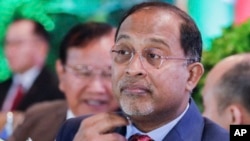
Zambry Abdul Kadir, Malaysia’s higher education minister, said protests spreading across universities in the United States show that schools can’t ignore political tensions.
Helen Packer, reporting in Times Higher Education, said the minister reminded educators that universities are key in the development of leaders, individuals and societies. (April 2024)
Social media breaks are difficult, but necessary

Between online classes, maintaining social connections and working on projects, college students can have a hard time disengaging from the demands of technology.
In Florida International University’s PantherNOW, Ariana Rodriguez offers strategies for taking a break from social media. (April 2024)
- By Melos Ambaye
Many master's degrees aren't worth the investment, research shows
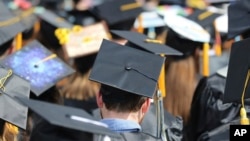
Nearly half of master's degrees have a negative financial return, according to new research by the Foundation for Research on Equal Opportunity, an economic research organization.
The study indicates that many graduate degree programs do not increase lifetime earnings enough to be worth it.
While 23% of bachelor’s degree programs yield a negative financial return on investment, 43% of two-year degrees and master’s degrees fail to deliver a return, according to the study by Preston Cooper, a senior fellow at FREOPP.
Cooper assessed the return on investment for 53,000 degree and certificate programs to determine whether a student’s lifetime earnings outweigh program costs and the risk of not completing their degree.
His findings show that a student’s field of study was the overriding indicator of return on investment at the undergraduate and graduate level.
Engineering, computer science and nursing bachelor’s degrees have high financial returns on investment, while programs in education, fine arts, psychology and English usually have low returns.
Graduate degrees in medicine and law tend to have strong payoffs. But a large share of master’s programs, including the MBA, frequently have low payoffs, according to Cooper.
Although workers with master’s degrees earn 16% more than those with only bachelor’s degrees, Cooper says the figure fails to account for students who had “higher preexisting earnings potential.”
“MBA students typically have high preexisting earnings potential, having often chosen high-ROI undergraduate majors such as finance and economics,” Cooper writes. “So the MBA adds little value on top of that.”
The study indicates that high starting salaries are predictors of high returns on investment. Degrees with starting salaries of $57,000 a year or more deliver the best lifetime returns.
But the return on investment of a degree can vary depending on the educational institution.
“Students interested in fields with low average pay can still find some schools that do well transforming those fields of study into high-paying careers,” Cooper writes.
The quality of an institution also matters, said William Tierney, professor emeritus of higher education at the University of Southern California.
“An MBA from Harvard is a likely ticket to a good job,” Tierney told VOA. “An MBA from the University of Phoenix, less so.”
But students pursue graduate programs for more than just financial reasons.
“Some degrees open up careers in fields that students may enjoy, such as in the performing arts,” Robert Kelchen, head of educational leadership at the University of Tennessee, Knoxville, told VOA.
“Others can help gain access to social networks or simply help students learn about a topic that is of interest,” Kelchen added.
Cooper told VOA that it might make sense for students in degree programs with low returns on investment to switch majors if they can still graduate on time.
He found the worst outcome for a student’s return on investment is dropping out of college “because they must pay for one or more years’ tuition and spend time out of the labor force.”
Lawmakers who fund higher education have a responsibility in ensuring “higher education delivers on its promise of economic mobility,” Cooper said.
Nearly a third of federal funding, including Pell grants and student loans, pays for higher education programs that fail to provide students with a return on investment, according to the study.
Cooper’s view is that “some schools should shut down low-ROI programs and reallocate institutional resources to programs with a better return.”
“There's definitely this narrative out there that higher education is always worth it, and you should always try to get that extra degree because it will increase your earnings,” he told VOA. “That's reinforced by colleges who make lofty promises regarding their graduate degree programs' outcomes, which all too often fall short.”
Harvard students end protest as school agrees to discuss Gaza conflict
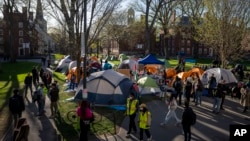
Protesters against the war between Israel and Hamas were voluntarily taking down their tents in Harvard Yard on Tuesday after university officials agreed to discuss their questions about the endowment, bringing a peaceful end to the kinds of demonstrations that were broken up by police on other campuses.
The student protest group Harvard Out of Occupied Palestine said in a statement that the encampment "outlasted its utility with respect to our demands." Meanwhile, Harvard University interim President Alan Garber agreed to pursue a meeting between protesters and university officials regarding the students' questions.
Students at many college campuses this spring set up similar encampments, calling for their schools to cut ties with Israel and businesses that support it.
The Israel-Hamas war began when Hamas and other militants stormed into southern Israel on October 7, killing some 1,200 people and taking 250 hostages. Palestinian militants still hold about 100 captives, and Israel's military has killed more than 35,000 people in Gaza, according to Gaza's Health Ministry, which doesn't distinguish between civilians and combatants.
Harvard said its president and the dean of the Faculty of Arts and Sciences, Hopi Hoekstra, will meet with the protesters to discuss the conflict in the Middle East.
The protesters said they worked out an agreement to meet with university officials, including the Harvard Management Company, which oversees the world's largest academic endowment, valued at about $50 billion.
The protesters' statement said the students will set an agenda that includes discussions on disclosure, divestment, reinvestment and the creation of a Center for Palestine Studies. The students also said that Harvard has offered to retract suspensions of more than 20 students and student workers and back down on disciplinary measures faced by 60 more.
"Since its establishment three weeks ago, the encampment has both broadened and deepened Palestine solidarity organizing on campus," a spokesperson for the protesters said. "It has moved the needle on disclosure and divestment at Harvard."
Chinese students report interrogations, deportations at US airports
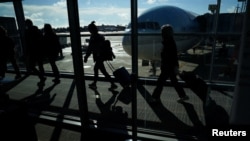
Academics from China are reporting increased scrutiny at U.S. airports, with valid visa holders being interrogated and turned away by Customs and Border Protection Agents.
Phones and laptops have been searched, and researchers have undergone extensive questioning about their work. One graduate student at Yale, who was midway through her PhD, was turned back at Dulles airport and banned from entering the U.S. for five years, according to The Guardian.




